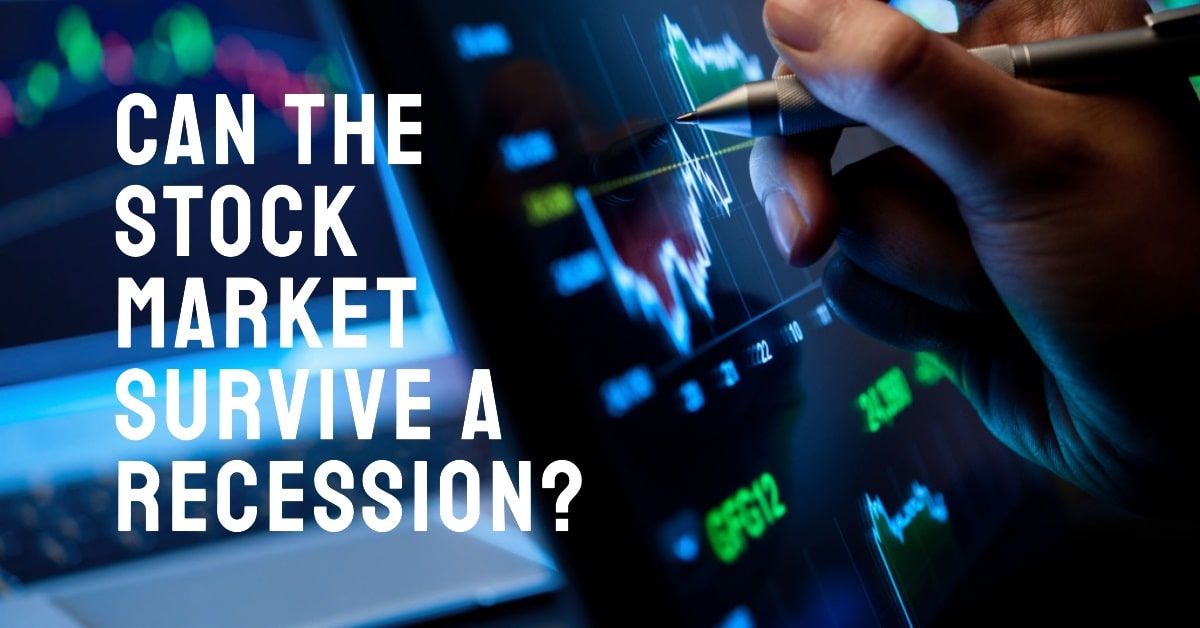Introduction
The stock market and the broader economy are deeply intertwined, but their relationship is more complex than many realize. A common assumption is that a recession, which is a period of economic decline, will invariably lead to a plummeting stock market. However, history has shown that the stock market can, and sometimes does, rise during a recession. This article delves into the reasons behind this seemingly counterintuitive phenomenon.
What is a Recession?
Understanding the dynamics between the stock market and economic downturns requires a clear grasp of what constitutes a recession. This term, often thrown around in financial news and discussions, has specific criteria and implications that are vital for both investors and policymakers.
Definition of a Recession
At its core, a recession is typically defined as two consecutive quarters of negative GDP growth. The Gross Domestic Product (GDP) measures the total value of goods and services produced by a country. When this number shrinks for two successive quarters, it signals that the economy is contracting rather than growing.
Causes of a Recession
Recessions can be triggered by a myriad of factors, some of the most common being:
- High Inflation: When the prices of goods and services rise rapidly, it erodes purchasing power, leading to decreased consumer spending. This can slow down the economy significantly.
- High Unemployment: If a large portion of the population is unemployed, it means fewer people have disposable income to spend, leading to reduced consumer demand and business revenues.
- Decreased Consumer and Business Confidence: If consumers and businesses are pessimistic about the future state of the economy, they’re less likely to spend and invest. This reduction in spending and investment can lead to an economic slowdown.
- Geopolitical Events: Wars, terrorist attacks, or other significant global events can disrupt trade and create uncertainty, leading to economic contractions.
- Financial Crises: Situations where financial institutions face liquidity shortages or insolvencies can lead to reduced trust in the financial system, decreased lending, and, consequently, a recession.
Effects of a Recession
When a recession hits, its effects ripple through various sectors of the economy:
- Business Closures: As consumer demand falls, some businesses might not generate enough revenue to sustain operations, leading to closures or bankruptcies.
- Rise in Unemployment: With businesses struggling or shutting down, layoffs become more common, leading to an increase in unemployment rates.
- Reduced Consumer Spending: With uncertainty in the air and potential job losses, consumers tend to cut back on spending, especially on non-essential items.
- Government Intervention: Governments might step in with stimulus packages, monetary policy changes, or fiscal measures to try and revive the economy.
Recovery from a Recession
Recessions, while challenging, are a natural part of economic cycles. Over time, economies tend to recover and enter a phase of expansion. The duration and severity of the recession, combined with the effectiveness of policy measures, will determine how quickly an economy bounces back.
Factors Influencing Stock Market Performance
While the health of the broader economy plays a significant role in stock market performance, it’s not the sole determinant. The stock market is a complex entity influenced by a myriad of factors, some of which can lead it to behave in ways that might seem counterintuitive during a recession. Let’s delve deeper into these influencing factors:
1. Central Bank Policies
Central banks wield enormous influence over economies. Their policies can have direct and indirect effects on stock market performance.
- Interest Rate Changes: Central banks can adjust interest rates to either stimulate economic growth or curb inflation. Lower interest rates can make borrowing cheaper for businesses, potentially boosting their profitability. Additionally, when interest rates are low, fixed-income assets like bonds might offer lower returns, making stocks more attractive by comparison.
- Quantitative Easing: This is a method where central banks purchase government securities or other securities from the market to increase the money supply and encourage lending and investment. By doing so, they can indirectly boost stock market sentiment.
2. Corporate Earnings
The stock market is, at its core, a reflection of its listed companies’ collective health. Thus, corporate earnings play a pivotal role.
- Sectoral Resilience: Not all sectors are equally affected by a recession. For instance, while luxury goods might see a decline in demand, essentials like groceries or utilities might remain stable or even see growth. Companies in resilient sectors can post good earnings, supporting the stock market.
- Cost-Cutting Measures: During tough economic times, companies might implement cost-cutting measures to maintain profitability. Successful implementation can result in better-than-expected earnings, positively influencing stock prices.
3. Investor Sentiment
Beyond the hard numbers, the stock market is also driven by perceptions, emotions, and expectations.
- Future Expectations: The stock market is inherently forward-looking. If investors believe that the economy will recover soon or that certain sectors will thrive post-recession, they might buy stocks in anticipation, driving prices up.
- Herd Mentality: Stock markets can sometimes be influenced by the collective actions of investors. If a critical mass of investors starts buying, others might follow suit, fearing they’ll miss out on potential gains.
4. Global Factors
In our interconnected global economy, events in one part of the world can have ripple effects elsewhere.
- Foreign Investment: If foreign investors see value or potential in a country’s stock market during its recession, their investments can drive stock prices up.
- Global Economic Health: Even if one country is in a recession, positive economic data or growth in other major economies can boost investor sentiment globally.
- Trade Relations: Positive developments in trade relations, such as the signing of trade agreements, can improve investor sentiment and stock market performance.
5. Technological Advancements and Innovations
In the modern era, technological breakthroughs can significantly influence stock markets.
- Disruptive Technologies: Companies at the forefront of innovations, such as AI, biotech, or renewable energy, can see stock gains if the market perceives their technology as game-changing, irrespective of broader economic conditions.
- Adaptability: Companies that quickly adapt to changing circumstances using technology, like shifting to e-commerce during physical lockdowns, can outperform their peers and positively influence the stock market.
Historical Instances of Stock Market Gains During Recessions
While the general perception is that stock markets decline during recessions, history has shown that this isn’t always the case. There have been instances where stock markets have rallied or shown resilience even amidst economic downturns. Analyzing these instances can offer valuable insights into the complex interplay between the stock market and the broader economy.
The Early 1980s
The early 1980s witnessed a peculiar scenario where the U.S. economy was grappling with a recession, but the stock market began to show signs of a bull run.
- Backdrop: The U.S. economy entered a recession in the early 1980s, primarily due to tight monetary policies aimed at curbing high inflation. Unemployment rates surged, and many businesses struggled.
- Stock Market Response: Despite the bleak economic landscape, the stock market began a significant bull run in 1982. Several factors contributed to this:
- The Federal Reserve started easing its monetary policy, leading to falling interest rates.
- Investors began to anticipate an economic recovery and started buying stocks in expectation of future gains.
- There was a belief that the worst of the recession had passed, leading to improved investor sentiment.
The 2007-2009 Financial Crisis
The financial crisis of 2007-2009 was one of the most severe economic downturns since the Great Depression. However, the stock market’s response was noteworthy.
- Backdrop: Triggered by the collapse of the subprime mortgage bubble, financial institutions worldwide faced unprecedented challenges. The crisis led to widespread bankruptcies, massive layoffs, and a severe credit crunch.
- Stock Market Response: The stock market, as expected, took a significant hit initially. However, its recovery was remarkable:
- By March 2009, even though the broader economy was still mired in recession, the stock market began to rebound.
- Aggressive policy measures by central banks, including bailouts and quantitative easing, played a role in restoring investor confidence.
- The market’s forward-looking nature meant that investors were buying stocks in anticipation of an economic recovery, even if the present was challenging.
The Dot-Com Bubble and Early 2000s Recession
The burst of the dot-com bubble in the early 2000s led to a mild recession but provided another instance of the stock market’s complex behavior.
- Backdrop: The late 1990s saw a surge in tech stocks, driven by euphoria around the internet’s potential. However, by 2000, it became evident that many of these tech companies were overvalued, leading to a market crash.
- Stock Market Response: Post the dot-com bubble burst:
- While tech stocks suffered significantly, other sectors of the market remained relatively resilient.
- The Federal Reserve’s decision to slash interest rates helped in cushioning the stock market’s decline.
- By 2003, as the economy started showing signs of recovery, the stock market responded positively, led by sectors outside of technology.
Conclusion
The relationship between stock markets and recessions is intricate and multifaceted. While it’s instinctive to assume that economic downturns invariably lead to stock market declines, the reality, as history has shown, is more nuanced.
Several key takeaways emerge from our exploration:
- Forward-Looking Nature: The stock market is inherently anticipatory. It doesn’t just reflect the present state of the economy but also investors’ expectations about the future. This forward-looking nature can sometimes lead to stock market rallies even in the midst of a recession, especially if investors believe that a recovery is on the horizon.
- Diverse Influences: Stock market performance is influenced by a plethora of factors, ranging from central bank policies and corporate earnings to global events and technological innovations. This diversity means that even if one or more factors are negative, others might offer support and buoyancy to the market.
- Sectoral Variations: All sectors don’t respond to recessions in the same way. While some might face significant challenges, others could remain resilient or even thrive. This diversity within the stock market can sometimes counterbalance the negative impacts of a recession.
- Importance of Strategy: For investors, these insights underscore the importance of a well-researched and diversified investment strategy. Relying solely on broader economic indicators can be misleading. A more holistic approach, taking into account various influencing factors and historical precedents, can lead to better-informed investment decisions.
- The Role of Policy Interventions: Government and central bank interventions can play a pivotal role in shaping stock market responses during recessions. Effective policy measures can restore investor confidence and stimulate economic activity, leading to positive stock market reactions.
In wrapping up, it’s essential to recognize that while stock markets and the broader economy are deeply interconnected, they don’t always move in lockstep. Economic downturns, though challenging, don’t spell doom for stock markets. With the right insights and strategies, investors can navigate these complex terrains and potentially find opportunities even in challenging times.
FinBrain Technologies
99 Wall St. #2023
New York, NY 10005


Leave a Reply